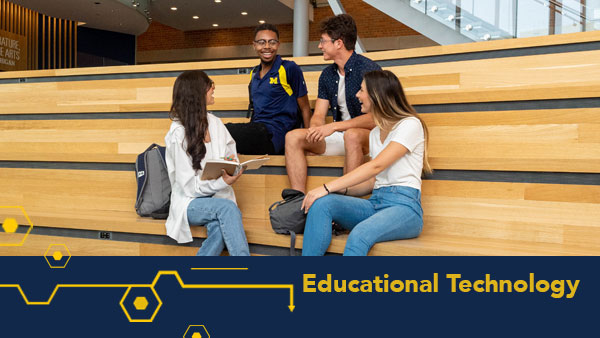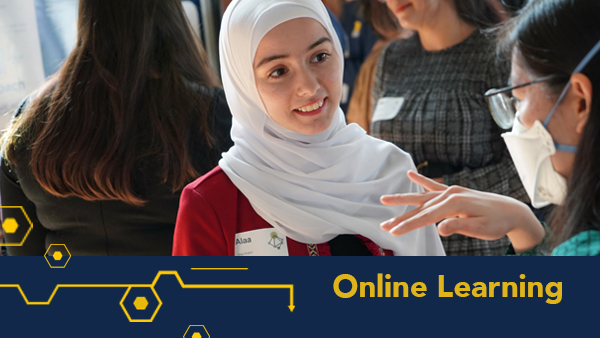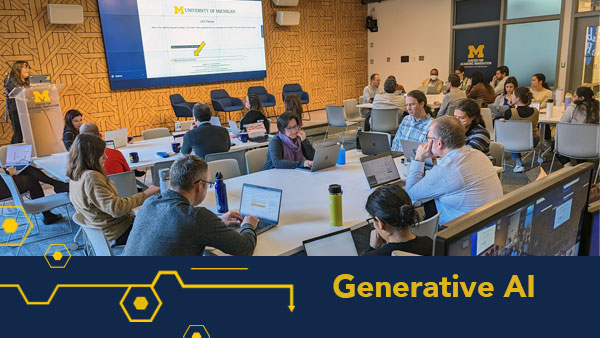James DeVaney, Associate Vice Provost for Academic Innovation
@devaneygoblue
Last week we welcomed Will Potter to the Office of Academic Innovation. Will joins our team as a Senior Academic Innovation Fellow at a time when we are increasing experimentation and investment at the intersection of academic innovation and public engagement. He also holds a new academic appointment in the Department of English.
The Academic Innovation team has had the great pleasure of working with and learning from Will over the past year through our U-M Teach-Out Series where he co-created a Teach-Out and contributed to several others. He brings a rich set of experiences and critical expertise to an Academic Innovation team that seeks to reimagine public engagement and embrace storytelling to advance learning at all levels.
Will was the first journalist to be selected as a TED Senior Fellow. He was awarded the prestigious Knight Wallace Fellowship in Law Reporting at the University of Michigan and later became a Marsh Professor of Journalism. He teaches courses on investigative journalism, social movements, and whistleblowing, and led a Teach-Out titled Fake News, Facts, and Alternative Facts.
Will and I connected as he settled into his first week at the Office of Academic Innovation and discussed citizenship in the modern era, the art of storytelling, and the University of Michigan’s powerful history of public engagement.
1. You’re joining the Academic Innovation team as a senior academic innovation fellow with a focus on digital storytelling. How does one become an expert digital storyteller?
Punk rock. Well, that was my path at least. I started writing for the Dallas Morning News and other newspapers when I was 17, with every intention of following a conventional career path. But the rise of online publishing left the industry scrambling to adjust its revenue model, and hiring freezes, bureau closures, and layoffs became the norm. It felt like most journalists were waiting for their editors to come up with solutions, and that didn’t sit well with me. Growing up in the punk scene, with its heavy emphasis on do-it-yourself ethics, profoundly shaped my worldview. In that community, if you want to start a band and tour the world, you don’t wait for anyone’s permission—you teach yourself and make it happen.
So I decided to do the same thing with my journalism. I created my own online news service, and built my own distribution channels. When I published my first book with City Lights, I enlisted friends in L.A. to direct a movie-style trailer that we distributed online, and I relied on my social media networks to book international speaking tours. I was the first investigative journalist to be named a TED Senior Fellow, which created many more opportunities for experimentation with digital storytelling. In hindsight, I feel fortunate to have started my career in a non-digital era, because quality digital storytelling is, above all else, simply old-fashioned narrative techniques combined with a willingness to take chances.
2. Your contributions in this capacity will be grounded in your ongoing work as an investigative journalist. What are you working on now?
After my first book was published, an anonymous source leaked me some surveillance documents created by the Counter Terrorism Unit that mentioned my name. Out of curiosity, I filed an open records request, and with the help of the Center for Constitutional Rights I obtained government surveillance documents about my articles, speeches, website, and book (which, if I may brag, is described in the Counter Terrorism Unit files as “compelling and well-written”). That experience is the foundation of my next book, which will combine narrative nonfiction, investigative reporting, and intertwined memoir. I’ve been working with students on a Freedom of Information Act campaign to investigate both the history and contemporary scope of governmental surveillance of journalists. I’m practicing what I’m preaching in this new role, so to speak, in that I’ll be publicly-engaged throughout this process, while working with Academic Innovation and teaching in the English department. I’ll also be pushing my own comfort zones by working with a team to film a documentary of the journey, and experimenting with media tie-ins for print publications like an interactive ebook and websites.
3. How does your life as a journalist influence the way you think about innovation in teaching and learning and about the way U-M approaches public engagement? What is the significance of building narrative in creating awesome learning experiences?
Human beings are storytellers. That is perhaps the only marker that truly separates us from other animals—not an ability to feel pain, love, joy, or grief, or even an ability to communicate our needs and desires, but the ability to tell complex stories that help us make sense of the world, and our aspirations within it. We most often use the term storytelling when talking about fiction or film. But it’s a mistake to think of story in such a narrow sense. As a journalist, I am of course conscious of the stories I tell my readers, but more importantly my life as a journalist is rooted in exposing the false narratives used by people in power to deceive. I am convinced that the best way to counter these narratives of hate, fear, anti-intellectualism, and control that have grown louder in our culture is by speaking up honestly and passionately in defense of our shared democratic values. That’s why I am so excited to be part of U-M’s public engagement initiatives. Being mindful of the stories we tell, and the false stories we are countering, not only helps create memorable learning experiences for our students, but it will also help us to share our expertise in dialogue with the general public.
4. You teach courses on investigative journalism, social movements, and whistleblowing. Do you have a favorite topic to cover with your students?
Ben Bradlee, who served as executive editor of the Washington Post for 23 years, was infamous for what he expected to see in a Post story. He called it a “holy shit moment”: that point in which the reader learns something new/surprising/fascinating/helpful or just plain memorable. It’s not enough if the story matters to the writer, if it’s lyrically written, or even if it’s newsworthy. If the reader doesn’t want to tell a friend about the story the moment they finish reading it, you’ve lost an opportunity. It’s an elusive moment, both in journalism and in the classroom, but I’m constantly searching for opportunities to connect my courses to students’ lived experiences.
In my whistleblowing course, for instance, I invited Bastian Obermayer, the journalist who broke the Panama Papers, to discuss the ethical dilemmas he faced when an anonymous source leaked 2.6 TB of financial data to him, and how that Pulitzer Prize-winning story was only possible through innovation and international collaboration. Dayo Aiyetan, a Knight-Wallace Fellow, discussed whistleblowing in his home of Nigeria, which contextualized the attacks on journalism and whistleblowing we are witnessing right now in the United States. In my journalism courses, one of my favorite exercises is to visit the Joseph A. Labadie Collection on campus and explore minority and underground newspapers from the 1950s and 60s. As one student said last semester, it was shocking to see articles on police shootings from the 60s that looked like they could have been published in 2017, but inspiring to see this legacy of truth-telling for social justice.
As both a working journalist and an educator, that’s the type of Bradlee moment I hope to facilitate.
5. What questions and activities do you hope to explore through your new role? How do you hope to work with faculty and student innovators?
The University of Michigan has a powerful history of public engagement, and in my new role I am excited to be part of what I believe is the next chapter of that legacy. There are two areas of focus, in particular. As folks reading this most likely already know, the first Teach-In took place here on campus in 1965, starting a movement that spread to 40 other universities. Today’s Teach-Outs update this model for a digital era, and I’m thrilled to be part of this team both in terms of hosting interviews and also envisioning the next iteration of the form.
The University of Michigan also has a powerful history when it comes to storytelling and journalism. Our campus was home to what is generally believed to be the first newspaper writing course in the United States—then called “Rapid Writing”— in 1890-91. Journalist alumni include Pulitzer Prize-winners Eugene Robinson, Ann Marie Lipinski, Lisa Pollak, and many, many more. Today, the prestigious Knight-Wallace Fellowship brings journalists from around the world for a year of study and collaboration with faculty on campus, and Wallace House also honors the next generation of new journalists with the Livingston Awards. Comparable programs at Harvard and Stanford connect their fellows with journalism initiatives at those universities. Unfortunately, though, the journalism program at the University of Michigan was shuttered in the 1990s. In this new role, I’ll be thinking through what an updated model might look like, and how we might honor our legacy and also be at the forefront of innovation. I hope to help both faculty and students became better storytellers, regardless of their area of expertise or professional goals.
More broadly speaking, I am looking forward to conversations around campus about what, in my opinion, might be the defining issue of our time: the meaning, and responsibilities, of citizenship in the modern era. Core democratic institutions—the public university and the free press—are being decried by elected officials as the enemy of the people. I might be biased, in that my new hybrid role involves a foot in both of those worlds, but I’m proud of how both journalists and educators have responded to those attacks—a reexamination and reaffirmation of the civic responsibility that drives us.
6. What else should Academic Innovation affiliated faculty, staff, and students ask you about?
Anything. Really! I’m happy to chat about digital storytelling, literary journalism, or how I approach tailoring narratives for diverse mediums ranging from TED to the evening news. Also: restoring vintage motorcycles. If it happens to be outside of my wheelhouse, we can learn about it together.


